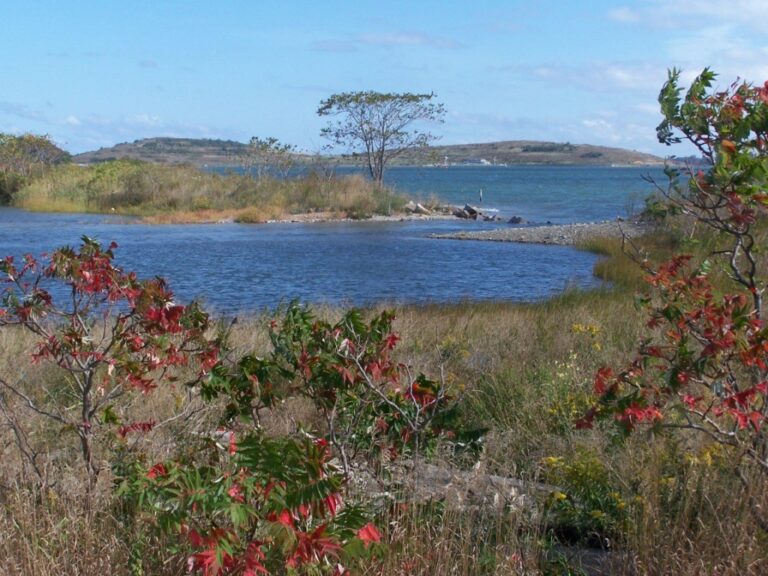Memorial Day Weekend Stewardship Saturday

Image: Thompson Island
On May 27th, Boston Harbor Islands’ Science and Stewardship team hosted a terrific Stewardship Saturday volunteer event! Full-time Biologists Rachel and Maria, with assistance from seasonal Biologist Ryan and seasonal Ranger Thomas, led a group of 26 volunteers to Thompson Island to clip invasive plant species.
The weather was perfect—sunny and warm with a slight breeze. Upon arrival, the volunteers received an orientation on the Thompson Island Outward Bound Education Center, the organization that owns and maintains the island, as well as the indigenous peoples who have historically called Thompson Island home. Following this, the group migrated to the staging grounds for where the invasive species removal would primarily occur.
Rachel and Maria introduced the volunteers to the two invasive species the group would be targeting for removal: Multiflora Rose (Rosa multiflora) and Oriental Bittersweet (Celastrus orbiculatus). These two plants were variably introduced by humans after European colonization, and their rapid and aggressive growth habits threaten to smother and replace native New England plants like Common Blackberry (Rubus allegheniensis) and various Sumac species (Rhus spp.). These plants also form dense thickets that create barriers in the ecosystem which limit or prevent native wildlife from obtaining food or water.
Rachel and Maria also covered proper invasive plant removal technique—volunteers were instructed to clip these plants rather than pulling them from the ground. Pulling invasives heavily disturbs the soil in a given area, aiding in erosion and disturbing the soil ecosystem that remaining native plants require to thrive. And from a cultural perspective, such aggressive tactics are seen as destructive and disrespectful towards the surrounding biological community.
Volunteers tucked their socks into their pants to prevent tick bites, applied sunscreen, and ensured they were hydrated before diving into their work with enthusiasm. The general atmosphere of the event was quite friendly and lively—several small groups formed across the designated work area and each one was engaged in casual conversation while aiding one another in the task. Between the four NPS staff members and a handful of experienced returning volunteers, there were also plenty of opportunities for those new to this kind of work to learn more about the native Boston Harbor plant ecosystem. Along the way to clearing out the targeted invasives, the group identified an invasive Buckthorn species (Rhamnus cathartica) that also met the sharp end of the volunteers’ pruning equipment.
During the mid-day lunch break, the volunteers found a wonderful space beneath a shady tree where most everyone ate together and shared stories of travel and other volunteer engagements. In particular, a few volunteers had recently returned from the Scottish Highlands where they had participated in efforts aimed to rewild the Caledonian Forest ecosystem that once dominated that region.
After another hour and a half of weeding out those invasives, volunteers returned to the ship headed back to land. Many thickets of Multiflora Rose and Bittersweet remain, but more Stewardship Saturdays will be held from now until October. If you’d like to learn how to be a more active steward in your national park, visit www.bostonharborislands.com/volunteer. We hope to see you out there next time!